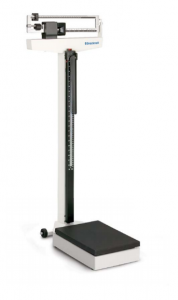Healthcare professionals and the healthcare industry worldwide use physician and healthcare scales. From monitoring a patient’s health to advancing public health, physician and health scales are used for various health-related applications. The scales are designed to provide accurate and reliable readings in assessing a patient’s health status, tracking changes over time, and making informed health decisions.
 Physician and healthcare scales are calibrated to deliver precise weight measurements. Accurate weight data is crucial for diagnosing and monitoring various medical conditions. As weight changes indicate potential health issues, accurate measurements of a patient’s weight further enable healthcare professionals to monitor overall health conditions, assess treatment effectiveness, and offer personalized care.
Physician and healthcare scales are calibrated to deliver precise weight measurements. Accurate weight data is crucial for diagnosing and monitoring various medical conditions. As weight changes indicate potential health issues, accurate measurements of a patient’s weight further enable healthcare professionals to monitor overall health conditions, assess treatment effectiveness, and offer personalized care.
The significance of physician scales extends beyond the care of individual patients. Compiling accurate weight measurements also provides valuable data that contributes to medical research and supports public health efforts and initiatives. Research and data collection provide valuable insights for studying population health trends, for use in conducting clinical trials, and, more importantly, for making evidence-based decisions for public health initiatives. Sharing such weight data with patients can be an informational and educational tool. It can provide context in discussing lifestyle changes, setting realistic goals, and encouraging patients to make healthier choices.
What are the Different Types of Scales in the Medical Field?
Medical professionals utilize different types of weight scales for specific purposes. Each type of scale, from the balance beam style scales commonly found in doctor’s offices to Body Mass Index (BMI) Scales, serves unique functions, whether assessing patient health, monitoring treatment progress, or providing valuable data for research and study. Here are some of the more common weight scales used in healthcare:
Physician’s Beam Scale
Also referred to as a balance scale, this traditional scale consists of a platform on one side and a set of sliding weights on the other. The patient’s weight is balanced against the known weights until equilibrium is achieved, allowing for accurate weight measurement. These scales are often found in medical clinics and hospitals.
Digital Scale
Digital scales have become more popular as much for their ease of use and accuracy as advances in technology. They use strain gauge technology to measure weight, displaying the result on a digital screen. Digital scales are commonly used in medical facilities, doctor’s offices, and home healthcare settings.
Body Mass Index (BMI) Scale
While not a separate type of scale, some digital scales are equipped with BMI calculation functionality. BMI is a value derived from a person’s weight and height, providing an indication of their body fat and potential health risks. BMI scales assess whether a patient’s weight falls within a healthy range or is underweight, overweight, or obese.
Wheelchair Scale
These specialized scales are designed to accommodate patients who are unable to stand or have limited mobility. Wheelchair scales have ramps for easy access, allowing healthcare professionals to weigh patients while seated in their wheelchairs.
Bariatric Scale
Bariatric scales are built to handle patients who are severely overweight or obese. These scales have a higher weight capacity and a larger platform to ensure accurate measurements for heavier patients.
Pediatric Scale
As the name suggests, these scales are designed for infants and young children; pediatric scales are equipped with an adjustable tray or cradle to safely and comfortably weigh babies. Some pediatric scales also come with a mechanism to subtract the weight of diapers or clothing to accurately measure the child’s weight. Another type of pediatric scale is the neonatal scale, specifically designed to weigh premature babies or infants with difficulty gaining weight.
In-Bed Scales
Primarily found in hospitals and nursing homes, in-bed scales are used to weigh bed-bound patients. The scales allow patients to be weighed comfortably from the bed on a stretcher and lowered to bed level. Hydraulic lift mechanisms assure patient safety, and digital indicators subtract the weight of the patient’s bedding for accurate readings.
Veterinary Scales
Used by veterinarians and animal care professionals to monitor animal health and growth, veterinary weighing scales are designed for animals large and small. Veterinary scales provide accurate weight from livestock such as horses, cows, and pigs to household pets and lab animals. They come in various platform sizes and capacities and feature dynamic weighing options to capture accurate measurements for animals prone to move around on the weighing platforms.
Physician scales are vital tools in the healthcare industry. From tracking changes in a patient’s weight over time to assessing their overall health, medical professionals can make important decisions about care, treatment plans, and interventions. The data compiled also provides valuable insight for research and public health initiatives. Different types of weight scales are designed for specific purposes, depending on a patient’s needs, the medical or clinical facility, and the level of detail required for accurate health assessment or analysis.
Why Choose Worcester Scale? The Scale Experts
Worcester Scale offers a wide variety of physician scales and healthcare-related scales utilized by medical and research professionals daily. We carry all the top brands used throughout the healthcare industry worldwide. Contact us for more information or to discuss particular physician scale needs or applications.



Leave a Reply